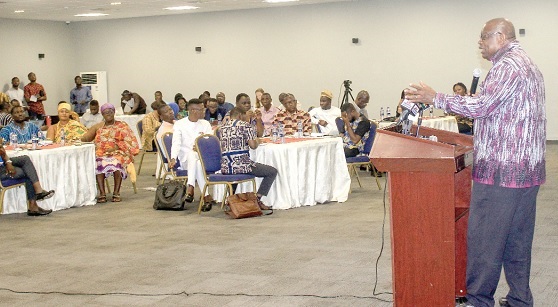
Manage lithium resource responsibly - Prof. Ernest Aryeetey to govt
The government has been entreated to manage the lithium resource found in commercial quantities in the country responsibly to maximise its benefit for accelerated development.
The Vice-Chairman of the Natural Resource and Governance Institute (NRGI), Prof. Ernest Aryeetey, said citizens, especially people in the Mfantsiman District in the Central Region where lithium had been discovered, were hopeful that mining of the resource would lead to improvement in livelihoods rather than being a curse.
He said the discovery of lithium was happening at a time the world was moving away from fossil fuels to cleaner energy sources, which the vice-chairman said put the country in a better position to gain more from its latest discovery.
“Ghana is sitting on something that everybody wants.
The mining of lithium is different because it is happening at a time that the whole world is making demand for lithium,” he added.
Prof. Aryeetey was addressing a day’s national stakeholder dialogue on energy transition with a focus on lithium discovery in the country in Accra yesterday.
The dialogue was aimed at exploring the potential impact of the discovery of lithium and also identify strategies and policies that will ensure the nation derived maximum benefit from the resource.
It was organised by the Institute for Energy Security (IES), in partnership with Africa Centre for Energy Policy (ACEP) and the National Resource Governance Institute.
Lack of capacity
Prof. Aryeetey further mentioned the lack of capacity as one of the major problems that had prevented the country from maximising its resources for growth and, therefore, stressed the need for the training of the youth in new mining technologies.
He said the social and economic impact of exploring new minerals where companies from the global north used technologies that were alien in resource-rich countries was denying such countries the needed revenue.
Prof. Aryeetey also said that governance and regulatory processes in the mining of new minerals must be strengthened, while calling for transparency in all dealings to avoid the canker of corruption in the sector.
The Executive Director of IES, Nana Amoasi VII, said the dialogue was also to increase public awareness of the risk the country was likely to encounter in the mineral supply value chain.
“It is worth mentioning that the impact of corruption in harnessing resources for development is deep and systemic.
“It opens the gates to a flood of other risks, from environmental degradation to human rights abuses and conflict financing,” he added.
Recommendations
As part of recommendations for a robust mining sector, a senior economic analyst at NGRI, Dr Charles Ofori, mentioned prevention of the political elite from taking unfair advantage in the sector.
He also said that there must be a conscious effort to strengthen enforcement of rules by making the implementation of regulations unbiased and effective.
